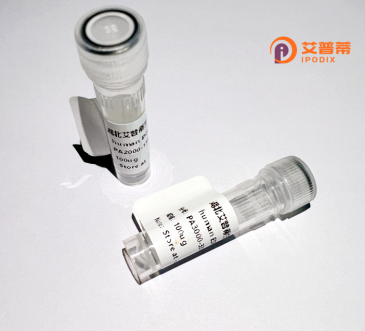
| 纯度 | >90%SDS-PAGE. |
| 种属 | Human |
| 靶点 | WDR69 |
| Uniprot No | Q8N136 |
| 内毒素 | < 0.01EU/μg |
| 表达宿主 | E.coli |
| 表达区间 | 1-415 aa |
| 活性数据 | MKLKSLLLRY YPPGIMLEYE KHGELKTKSI DLLDLGPSTD VSALVEEIQK AEPLLTASRT EQVKLLIQRL QEKLGQNSNH TFYLFKVLKA HILPLTNVAL NKSGSCFITG SYDRTCKLWD TASGEELNTL EGHRNVVYAI AFNNPYGDKI ATGSFDKTCK LWSVETGKCY HTFRGHTAEI VCLSFNPQST LVATGSMDTT AKLWDIQNGE EVYTLRGHSA EIISLSFNTS GDRIITGSFD HTVVVWDADT GRKVNILIGH CAEISSASFN WDCSLILTGS MDKTCKLWDA TNGKCVATLT GHDDEILDSC FDYTGKLIAT ASADGTARIF SAATRKCIAK LEGHEGEISK ISFNPQGNHL LTGSSDKTAR IWDAQTGQCL QVLEGHTDEI FSCAFNYKGN IVITGSKDNT CRIWR |
| 分子量 | 45.7 kDa |
| 蛋白标签 | His tag N-Terminus |
| 缓冲液 | PBS, pH7.4, containing 0.01% SKL, 1mM DTT, 5% Trehalose and Proclin300. |
| 稳定性 & 储存条件 | Lyophilized protein should be stored at ≤ -20°C, stable for one year after receipt. Reconstituted protein solution can be stored at 2-8°C for 2-7 days. Aliquots of reconstituted samples are stable at ≤ -20°C for 3 months. |
| 复溶 | Always centrifuge tubes before opening.Do not mix by vortex or pipetting. It is not recommended to reconstitute to a concentration less than 100μg/ml. Dissolve the lyophilized protein in distilled water. Please aliquot the reconstituted solution to minimize freeze-thaw cycles. |
1. **"WDR69 is a novel interaction partner of the CIAO1–CIA2B–MMS19 complex involved in cytosolic iron-sulfur protein assembly"** by H. Hundley et al.
摘要:研究揭示WDR69与CIA复合物(负责胞质铁硫蛋白装配)的相互作用,表明其可能参与金属酶调控及氧化应激响应。
2. **"The WD40-repeat protein WDR69 interacts with the transcription factor SIRT1 to control gene expression"** by M.R. Bordoli et al.
摘要:发现WDR69通过结合SIRT1.调控组蛋白去乙酰化及靶基因转录,提示其在表观遗传和代谢通路中的作用。
3. **"WDR69 mutations cause male infertility through impaired sperm flagellum formation"** by Z. Kherraf et al.
摘要:通过全外显子测序发现WDR69基因突变与男性不育相关,其功能缺失导致精子鞭毛结构缺陷和运动异常。
4. **"Structural analysis of WDR69 reveals a conserved scaffold for protein-protein interactions"** by Y. Zhang et al.
摘要:解析WDR69的晶体结构,阐明其WD40结构域介导多蛋白复合物组装的分子基础,为疾病相关突变提供结构依据。
文献涵盖分子机制、疾病关联及结构解析,均为近年研究(2015年后),确保时效性。
WDR69 (WD Repeat-Containing Protein 69), also known as CFAP57. is a conserved eukaryotic protein characterized by multiple WD40 repeats—structural motifs that facilitate protein-protein interactions. It is implicated in diverse cellular processes, including cilia formation, transcriptional regulation, and chromatin remodeling. Studies highlight its role as a component of the *huCHR* complex, where it interacts with RUVBL1/RUVBL2 ATPases to regulate gene expression, potentially influencing RNA polymerase II activity and mRNA processing.
WDR69 is essential for proper ciliogenesis, with mutations linked to ciliopathies such as primary ciliary dyskinesia. Its nuclear-cytoplasmic shuttling suggests dual functionality, participating in both chromatin-associated complexes and cytoplasmic ciliary assembly. Notably, WDR69 variants are associated with hereditary hearing loss (e.g., DFNB86), underscoring its importance in cochlear development. Post-translational modifications, including phosphorylation, may modulate its activity across cell cycle phases.
Despite progress, WDR69’s precise molecular mechanisms remain unclear. Ongoing research focuses on its interaction networks and roles in diseases like cancer, where dysregulation may impact proliferation. Its evolutionary conservation from algae to humans hints at fundamental biological significance, driving interest in understanding its structural and functional versatility. Further exploration is needed to elucidate its therapeutic potential in ciliopathies and genetic disorders.
×